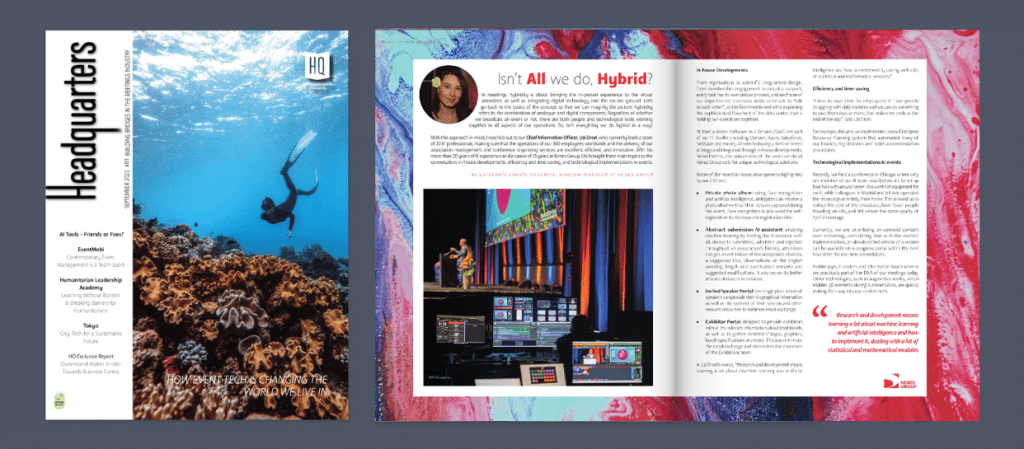
In meetings, hybridity is about bringing the in-person experience to the virtual attendees, as well as integrating digital technology into the on-site ground. Let’s go back to the basics of the concept so that we can magnify the picture: hybridity refers to the combination of analogue and digital components. Regardless of whether we broadcast an event or not, there are both people and technological tools working together in all aspects of our operations. So, isn’t everything we do, hybrid in a way?
With this approach in mind, I reached out to our Chief Information Officer Uzi Drori, who currently leads a team of 22 IT professionals making sure that the operations of our 350 employees worldwide and the delivery of our association management and conference organising services are excellent, efficient, and innovative. With his more than 20 years of IT experience and a career of 15 years at Kenes Group, Uzi brought three main topics to the conversation: in-house developments, efficiency and time-saving, and technological implementations in events.
In-house Developments
From registrations to scientific programme design, from membership engagement to industry support, every task has its own unique process, and each one of our departments’ processes needs to be able to “talk to each other”, as CIO Uzi Drori mentioned while explaining the sophisticated flowchart of the data centre that is holding our operations together.
At least a dozen Software as a Service (SaaS) are part of our IT Toolkit (including Clarizen, Azure, Salesforce, NetSuite and more), all selected using a best-of-breed strategy and integrated through in-house developments. Nevertheless, the uniqueness of the work we do at Kenes Group calls for unique technological solutions.
Some of the recent in-house developments highlighted by our CIO are:
- Private photo album: using face recognition and artificial intelligence, delegates can receive a photo album with all their pictures captured during the event. Face recognition is also used for self-registration to decrease the registration time.
- Abstract submission AI assistant: enabling machine learning by feeding the AI assistant with all abstracts submitted, admitted and rejected throughout an association’s history, attendees can get an estimation of the acceptance chances, a suggested title, observations on the English wording, length and punctuation remarks and suggested modifications. It also serves to better allocate abstracts to sessions.
- Invited Speaker Portal: one single place where all speakers can provide their biographical information as well as the content of their session and other relevant resources to minimize email exchange.
- Exhibitor Portal: designed to provide exhibitors with all the relevant information about their booth, as well as to gather exhibitor’s logos, graphics, booth specifications and more. This also minimizes the email exchange and streamlines the processes of the Exhibitions team.
In CIO Uzi Drori’s words, “research and development means learning a lot about machine learning and artificial intelligence and how to implement it, dealing with a lot of statistical and mathematical modules”.
Efficiency and time-saving
“I love to save time for employees! If I see people struggling with daily routine and we can do something to save them days or more, that makes me smile at the end of the day”, said CIO Uzi Drori.
For example, this year we implemented a new Enterprise Resource Planning – ERP system that automated many of our finance, registrations and hotel accommodation procedures.
Technological implementations in events
Recently, we held a conference in Chicago where only one member of our IT team travelled on-site to set up four halls with around seven kilos worth of equipment for each, while colleagues in Madrid and Tel Aviv operated the recordings remotely, from home. This allowed us to reduce the cost of the broadcast, have fewer people travelling on-site, and still deliver the same quality of hybrid coverage.
Currently, we are prioritising on-demand content over streaming, considering that with the current implementations, an already edited version of a session can be available on a congress portal within the next hour after the real-time presentation.
Mobile apps, e-posters and information touch screens are practically part of the DNA of our meetings today. Other technologies, such as augmented reality which enables 3D elements during a presentation, are quickly making their way into our conferences.
By MarCom Manager Estefanía Zárate Angarita
This article was originally published in HQ Magazine #111 / How event tech is changing the world we live in, September 2023: https://bit.ly/3te3ma8